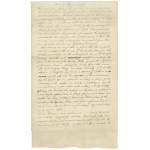Petition Against the New Echota Treaty
1836

This petition, signed by 3,352 Cherokee, urges the Senate not to ratify the New Echota Treaty because it is “so utterly repugnant to reason and justice and every dictate of humanity.” The treaty stripped the tribe of their land and rights, and eventually led to the "Trail of Tears."
The National Cherokee Council claimed the treaty was invalid because the Principal Chief did not sign it and the Cherokee that did were not authorized to. The Council wrote that they had "...full confidence that under such circumstances the voice of weakness itself will be heard in its cry for Justice."
A small group of Cherokee leaders who favored moving to land west of the Mississippi River and representatives of the U.S. government had signed the Treaty of New Echota in late December 1835. It required the eastern Cherokees to exchange their lands for land in the Indian Territory—what is today eastern Oklahoma. The Cherokees were to complete their removal to Indian Territory within two years.
Others opposed the treaty as well. New Englanders, religious groups, and missionaries who objected to the policy of removal flooded Congress and the President with petitions and memorials. Congress responded by tabling the petitions and memorials (laying them aside).
All but about 2,000 Cherokees ignored the treaty and refused to move to the West or begin making preparations for removal. This reaction was encouraged by Cherokee Chief John Ross and continued for nearly two years.
In 1838, Maj. Gen. Winfield Scott was ordered to push the Cherokee out. He was given 3,000 troops and the authority to raise additional state militia and volunteer troops to force removal. Despite Scott’s order calling for removal in a humane fashion, this did not happen. During the fall and winter of 1838-39, the Cherokees were forcibly moved from their homes to the Indian Territory—some having to walk as many as 1,000 miles over a four-month period. Approximately 4,000 of 16,000 Cherokees died along the way, a sad chapter in American history known as the “Trail of Tears.”
Transcript
[note in pencil at the top: omit the names]Whereas, we the citizens of the Districts of Aquohee and Taquoee in the Cherokee Nation, are informed that on the 21st of Dec 1835, certain individual Cherokees assembled at New Echota and, without any authority from the council or people of the Nation, entered into an agreement with the Revd Mr Schermer-horn under the name of a treaty by the provisions of which all the lands of the Cherokees are ceded; their Government and Law abolished, their private improvements: the property of individuals alienated from their rightful owners, without their consent: And all their rights, as free men, wrested from them and left to the discretionary disposal of strangers.
And, Whereas we are further informed that this compact is to be presented to the Senate of the United States for ratification, as a treaty; we the undersigned, do, with the deepest anxiety and the most [crossed out: earnestness] respectful earnestness, appeal to the Senate of the United States, against the ratification of the same. And in entering our protest before that honorable and August Body, we again humbly Solicit their attention to the following points on account of which we so [crossed out: depreciate] urgently depreciate the ratification of said instrument. Viz. the persons who are represented as acting in behalf of the Cherokees in this matter, are wholly unauthorized. And the circumstance of a few individuals making a treaty vitally affecting the liberties, the property and the personal rights of a whole people, appears to be so utterly repugnant to reason and justice and every dictate of humanity, that we come to the Senate of the United States with full confidence ^that^ under such circumstances the voice of weakness itself will be heard in the cry for justice.
To the Basis of said instrument and most of its details we entertain insuperable objections. But being fully persuaded that an instrument so unwarranted will not be sanctioned by the Senate, we deem it unnecessary to recite the
particular provisions which it contains, as we feel all assurance of the justice and magnanimity of the August body before whom we humbly presume to present our grievances.
[note in pencil: signed by 3.352 names]
[Followed by a partial list of names written in Cherokee syllabary.]
Note about Taquoee: These groups were from the Southeastern United States. There is also a Tuoquee District in the state of Kansas.
Activities that use this document
- Analyzing the Petition Against the Treaty of New Echota
Created by the National Archives Education Team
Rights: Public Domain, Free of Known Copyright Restrictions. Learn more on our privacy and legal page.





